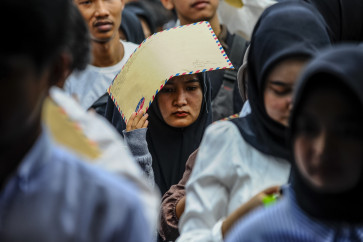Fight-or-flight: Pramuka Market and songbird survival
Cautious eye: A Javan pied starling for sale in a cage in Pramuka Market
Change text size
Gift Premium Articles
to Anyone

Cautious eye: A Javan pied starling for sale in a cage in Pramuka Market.(JP/Dames Alexander Sinaga)
The Pramuka Market bustled with activity in the stifling heat of East Jakarta. On a recent Tuesday, the air was filled with songs of thousands of various types of birds, including some protected under Indonesian law.
The stench was overpowering. Fowls and larger birds, including a pair of swans and a rooster pacing restlessly inside its cage, raucously demanded freedom.
Songbirds are popular in Indonesia, influencing breeders and traders to sell protected species of birds to maximize their profits. In contrast, animal rights activists persistently confront the illegal trade, urging the government to shut down notorious bird markets like the Pramuka Market.
Marison Guciano, executive director of animal rights watchdog FLIGHT, said the origin of the birds being sold in Pramuka Market remained “unconfirmed” since the government’s supervision of bird markets in Indonesia had been “weak”.
“[Traders] said their birds were sourced from breeders, but it is still unconfirmed. The government should confirm it by scrutinizing the breeders they mentioned,” Marison told The Jakarta Post in a recent interview.
He said his organization, in cooperation with the Agriculture Ministry’s quarantine agency and the police, intercepted shipments of at least 300 songbirds at the Bakauheni Port in Lampung in September. These birds, which included protected Oriental white-eyes and sunbirds, were destined for sale in Cirebon, West Java.
“If these smuggled birds had arrived at the destination market, it would have been really difficult for us to save and free them back into their natural habitat because the government’s supervision in bird markets is weak,” Marison said, adding that the island of Java is the largest market for the illicit bird trade.
In 2014, an international wildlife trade monitoring network, TRAFFIC, held a three-day survey in Pramuka Market, which determined that as many as 16,160 birds of 180 species were being sold. The Cambridge-based non-governmental organization reported that Pramuka Market — in operation since 1976 — is the largest bird market, along with two other major bird markets on Jl. Barito, South Jakarta, and in Jatinegara, East Jakarta. In total, there were 19,036 birds of 184 species sold in the three markets.
In its report, TRAFFIC also pointed out that eight of the species were assessed as “threatened” by the International Union for Conservation of Nature (IUCN).
In July this year, the Environment and Forestry Ministry issued Ministerial Decree No. 20/2018, updating the list of protected species from 677 to 919 after 19 years.
Animal rights activists and conservationists reacted positively, while songbird owners and breeders urged the ministry to revoke the decree or remove four particular songbirds from the updated list: the white-rumped shama, the chestnut-capped thrush, the greater green leafbird and the Javan pied starling.
A coalition of songbird fan groups, called the Indonesian Songbird Fan Club, said bird breeders would lose their livelihoods if the decree was enforced.
“The ministerial decree caused unrest among traders, breeders and songbird lovers,” said Boy, the leader of one of the fan groups in Jakarta, on Aug. 9, as quoted by iNews.com.
The objections of the coalition and other songbird lovers spilled over into the streets and onto the internet with the hashtag #TolakPermenLHK (Reject Ministerial Decree No. 20), motivating the ministry to revise the decree. The ministry then modified their protected birds list to exclude the straw-headed bulbul and the Javan pied starling, both registered as threatened on the IUCN Red List, as well as the white-rumped shama.
The outcry then shifted to animal lovers and activists, who voiced objections to this move.
“The reason why the ministry dropped the three birds from the new list was due to pressure from the breeders. The move was not based on a recommendation by LIPI,“ Marison said, referring to the Indonesian Institute of Sciences.
LIPI did not issue a recommendation until after the birds had been officially removed from the list. It then issued a letter recommending that the birds be returned to the list.
Amir Hamidy, a LIPI scientist who helped draft the initial list, told environmental news portal Mongabay.com that his institution advised protecting these species based on their scientific research that determined their populations in the wild.
The ministry later clarified that the revision was made after it had conducted a socio-economic impact study.
“During the creation of the list, the data was not always taken from the wild; there’s also ex situ data. This became our basis to change the status, as the ex situ bird population is numerous. Ex situ could support in situ,” Indra Exploitasia, the ministry’s director of biodiversity conservation, said in October as quoted by VOA Indonesia.
The ministry also clarified that the law would not be applied retroactively and that there would be a grace period for owners, breeders and traders to register their winged pets.
Marison said that although the government had done its part for biodiversity conservation in the country, more preservation efforts would be necessary.
Whatever people do, the caged birds in the Pramuka Market still sing beautifully despite having been transported in cramped pipes or crates to places thousands of kilometers from their natural habitats to share a cage with dozens of others of their kind.
________________________
Group reporting is a writing assignment for candidate journalists of The Jakarta Post. It is part and parcel of a two-month workshop organized for the Post’s cub reporters. A total of six candidates have completed their group reporting and writing assignments. The following are their journalistic products.









